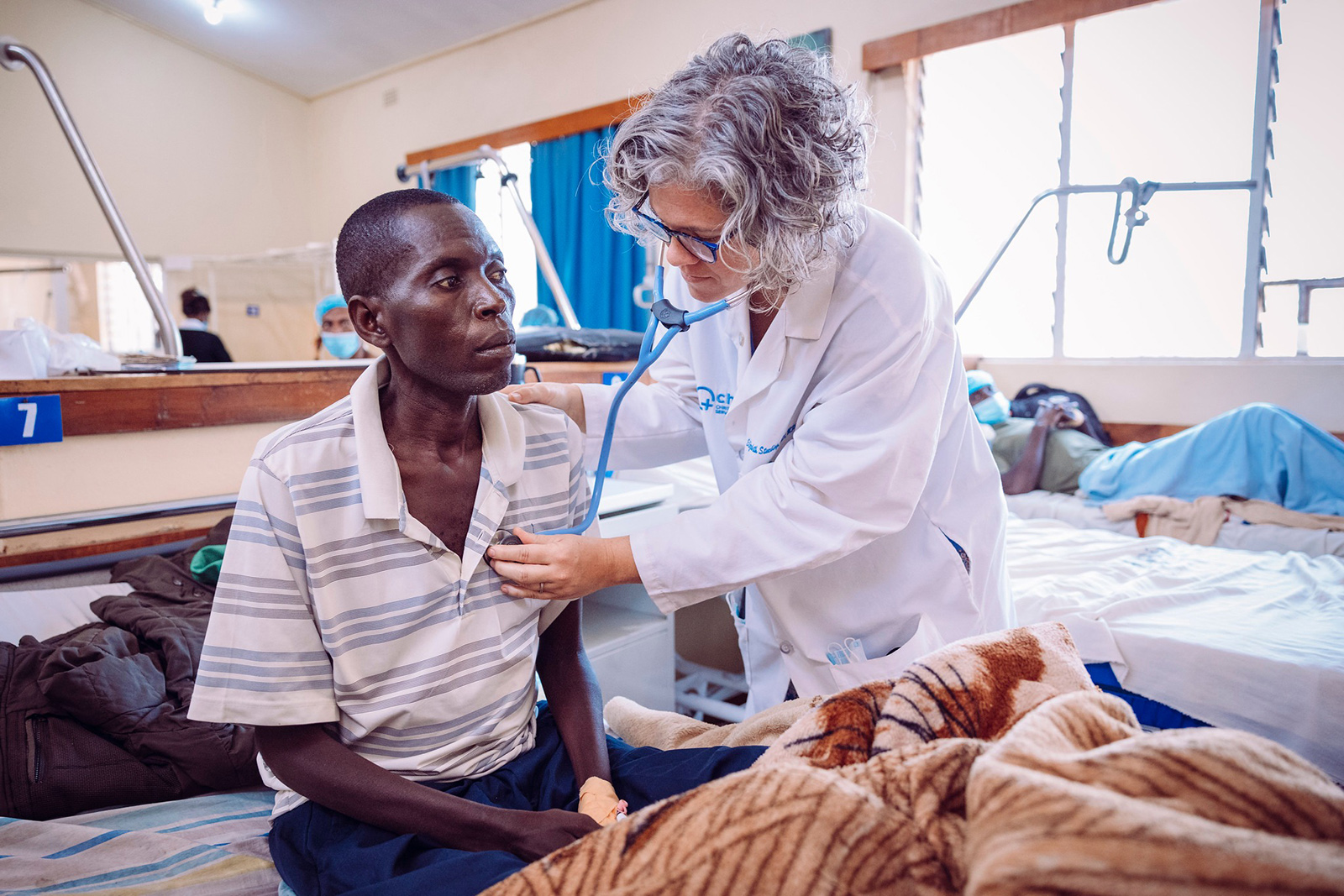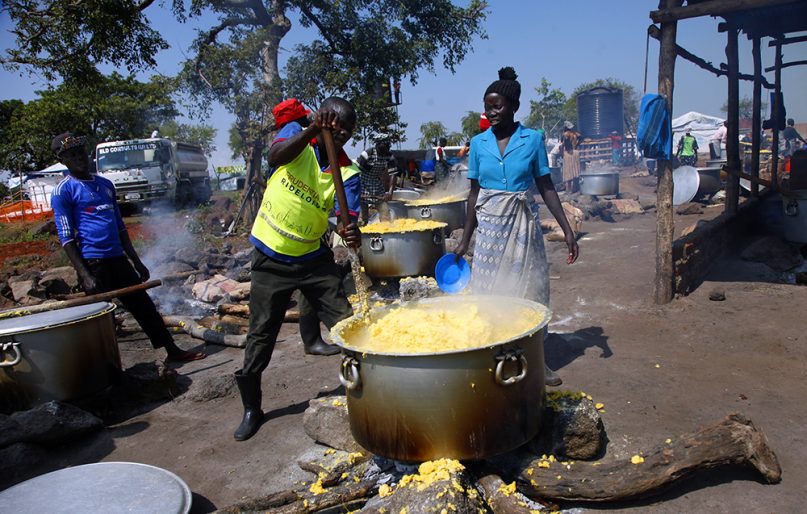
(RNS) — I have a day job that has nothing to do with feeding people. I’m a missionary trauma surgeon, training Christian Malawian doctors to become surgeons. In Malawi, a country of 21 million people, there’s roughly one surgeon for half a million residents, and to my knowledge I’m the only critical-care board certified physician in all of Malawi. Because of my skills, I’m frequently consulted by the U.S. Embassy and on call for U.S. special forces when they visit Malawi. I really need to do my day job.
Last week I did a lot of things besides my day job. After discovering that 20 nursing students at the college that supports our hospital had lost their funding due to the sudden demise of the U.S. Agency for International Development, I spent time trying to find a donor for them, so they and the school might find a way to continue to train the professionals my hospital desperately needs.
I spent several hundred dollars of my own money to feed them and paid my language teacher double, since much of his employment is also through USAID and has abruptly disappeared.
The USAID shutdown caused the hospital’s HIV clinic to close and access to malaria medicine for our pediatric ward full of patients to be cut off, as well as tuberculosis medications. I made calls, sent texts and emails, stayed up late at night, trying to help. A few, mostly HIV-related programs, have partially restarted after limited waivers were granted, but there’s still mass confusion and fear, and all programs remain under threat. One friend said he had barely slept in three days. Christian aid workers across the world have similar stories.
As the crisis unfolds, I’ve seen countless Christians happily proclaim on social media that “God will make a way,” or that “people of God on the ground” should be doing this kind of work, not the U.S. government. I am the “people of God” on the ground. My husband and three kids have barely seen me this week. Sometimes I have to spend hours in line to get gas for my car to go to work. So, no. The people of God cannot just take over.
There are three main reasons this is a terrible idea.

Refugees make maize porridge donated by USAID for South Sudanese refugees in the remote northwestern district of Adjumani, near the border with South Sudan, in Uganda, on Aug. 29, 2016. (AP Photo/Stephen Wandera)
First, “the church” is an inadequate and unreliable funding source for foreign missions. It’s not that churches and denominations don’t fund people, projects and organizations doing good work around the world; they do. But charitable giving by churches has plummeted in recent decades as priorities have shifted to domestic programs. Donations from churches and individuals to global workers have decreased further since COVID-19.
But the fact is, shifting global needs, policies and politics have always been far larger than any church can handle. Missions have long been underfunded. I know because family has been doing global work going back 100 years.
My great-grandparents were missionaries in what is now Zimbabwe, where my grandfather was born. My parents spent 40 years in Zambia, where I grew up during America’s “Me Generation.” My mom had to budget for flour to make birthday cakes. I was fortunate to go to a good college, but only thanks to a family friend and the death of an uncle who left my parents some money. After years of eating soybeans instead of burgers, I vowed to never be financially dependent on the church and stayed away from missions for more than a decade.
When I finally joined the “family business,” I entered the dreaded realm of fundraising. Even wealthy churches confirmed they were focused on local priorities and would not let me talk with their missions committees, let alone the congregation. My fundraised salary is still less than my family’s cost of living.
One area where support for mission families is particularly thin is medical care. Health insurance packages are riddled with conditions and costly out-of-pocket expenses. At a recent retreat for missionaries, a family explained their child had needed a life-saving procedure in the U.S., but care like that wasn’t covered. They praised God for providing doctors who performed the procedure for free, but I was dismayed. If mission budgets do not ensure appropriate care for missionaries’ kids, who on earth thinks they will provide reliable medical care for millions of non-Americans?
Second is the need for professional boundaries. Burnout and moral injury among missionaries and global workers is a frequent and costly problem — we witness horrible things and can’t always intervene. My parents stuck to their lane, training generations of Africans in advanced theological education and community development, but said no when asked to spend their time on community evangelism or church planting. Working beyond our assigned roles and expertise is a great way to drive an already strung-out global worker from the field for good.
Which is happening anyway. My parents did their jobs for four decades, and they loved it. Today if someone is in the field for five years, they are a veteran. My job was posted for three years with zero applications. There is no one to replace me if I leave.
Lastly, people don’t grasp the magnitude of the task being accomplished by USAID. Much of its work requires a massive system across continents, countries, governments and supply chains that the church is not remotely able to match.
Take just one example: PEPFAR is the program started by President G.W. Bush that provides antiretroviral drugs for those living with HIV. I remember Africa before PEPFAR. In Zambia in the 1990s, I was sometimes late to school because of the traffic lined up for simultaneous funerals. I remember next-door neighbors getting sick, leaving their children orphans. Newscasters would change every few months as yet another had died of “an extended illness.” More than 30% of the adult population of my hometown was HIV positive, and there was no medicine. The economy was in collapse. Unless you were a coffin maker.
My parents tried to help. In the early 2000s, before PEPFAR, a close friend from church contracted HIV from her wayward husband, who subsequently died of AIDS. She was caring for six children — her own and the kids her sister had left behind when she died of AIDS. My parents helped get Grace diagnosed and paid for her medicine, $75 every three months. Even with my parents’ help, she could not have sustained the cost long term. In those days, there were thousands of families like Grace’s in Zambia alone.
Then in 2003, PEPFAR stepped in and saved Grace, and millions in Africa like her. It saved the economies of multiple countries. It is one of the most successful health interventions in world history.
But PEPFAR takes billions of dollars and thousands of professionals — doctors, epidemiologists and mental health providers — to run smoothly. There is zero chance even well-funded Christian initiatives could tackle something so expansive. It takes the power of a country like the United States to coordinate this kind of effort.
Many other USAID programs are similarly large in scale, from providing critical nutrition and safe water to polio vaccines to the reading books dispensed to millions of Malawian school children, teaching them invaluable lessons.
All of this is to say, please stop. Stop acting like well-meaning Christians will just take over where USAID left off. Stop pretending the church will pay for even a fraction of this important work, because it won’t.
Stop expecting me to burn myself to a crisp, sacrificing my existing ministry, my family and my health, to do work I’m wholly unqualified to do in the first place. And stop claiming that any other entity is able to take over the massive, maybe not so well-oiled, but still very functional machine that is the U.S. government when it comes to foreign aid.

Dr. Beth Stuebing. (Courtesy photo)
The church’s frontline workers, missionaries like me, cannot afford any of that. We are not miracle workers. Even Jesus spent most of his time discipling a few instead of feeding the masses. That’s my goal, too. And my day job.
(Dr. Beth Stuebing, a missionary surgeon with Christian Health Service Corps, lives in Lilongwe, Malawi, with her husband and three children. The views expressed in this commentary do not necessarily reflect those of Religion News Service.)
